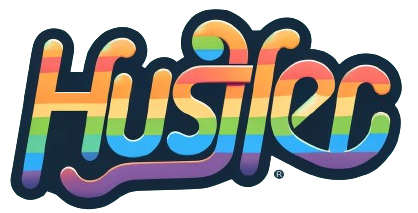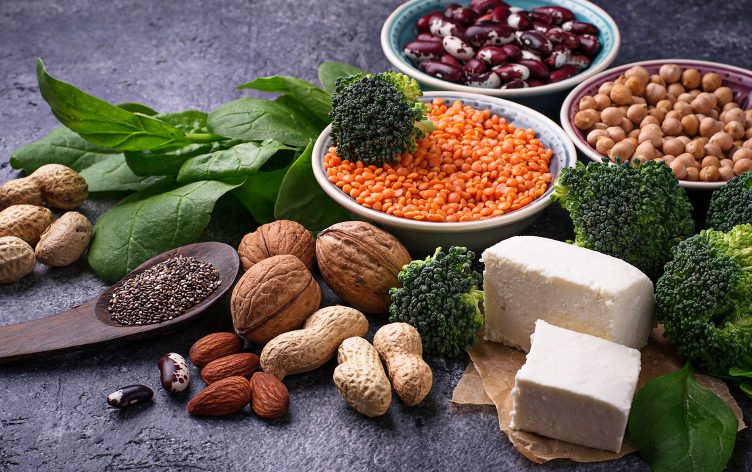More and more people are beginning to realise that you can survive quite well without needing to consume animal products, that is, on a vegan diet. In fact, many people who have switched over to a vegan lifestyle report that they feel healthier in all different areas of their lives: physically, mentally, and otherwise.
The first question that pops into many people’s heads, especially bodybuilders and athletes, when they are confronted with the idea of veganism is the same: where will I get my protein?
Where do vegans get protein from?
Coming from a competitive bodybuilding background this was my first question also. Prior to going vegan, my regular diet was a very calculated 2 serves of red meat plus 2-3 serves of white meat every day.
Well, one thing’s obvious: many of the animals that we get our protein from, such as cows, eat vegetarian diets. Yet they’re loaded with protein. This simple fact suggests that it is, indeed, possible to get high-quality protein from a vegan or vegetarian diet.
- Check out vegan recipes blog here.
But if you’ve never lived a vegan lifestyle before and you’re wanting to switch, sometimes you can feel like you’re getting thrown under the bus. However, some of the strongest and healthiest bodybuilders I’ve met have maintained a vegan lifestyle.
The most important thing that you need to know is how to source your protein and how to do it properly.
Vegan Protein & Bodybuilding
Before we jump into the list of quality vegan proteins and protein powders, I’ll give you some information about the proper way to consume protein as a vegan.
There are things that you will want to be cautious of if you’re going to go vegan and still hope to maintain your physique. While some people say that it’s as simple as just eating high-protein vegan foods, there’s more to it than that.
First off, bodybuilders generally require more protein than the average person. Since it can be more difficult to acquire protein from a vegan diet if you don’t know what you’re doing, it’s important to make sure that you know what you’re doing.
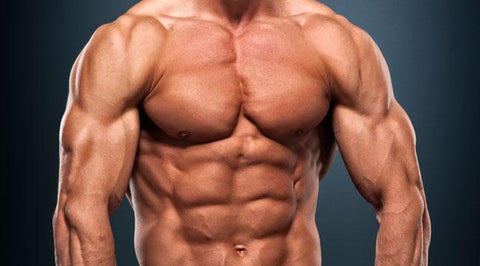
One of the most common mistakes that those new to the vegan diet make is not combining their grains properly. Many people will be quick to tell a new vegan that they can get a good amount of protein from eating beans or lentils. While this is true, it’s not the full story.
If you’re a bodybuilder then you probably already know that proteins are made up of amino acids. A complete protein has all of the essential amino acids in it. Animal proteins contain all of the essential amino acids and you don’t need to worry about mixing amino acids or different foods to acquire a protein source that your body can make use of.
Plant proteins, on the other hand, are a little bit different. While we have already mentioned some complete plant proteins above, generally when you’re trying to source your protein from plants you have to be aware of how you can get enough amino acids.
For example, grains like rice lack the amino acid lysine. For this reason, you can’t really consider rice a good source of protein, even if you eat a lot of it. Beans and legumes, however, are loaded with lysine. However, they lack some of the other amino acids, such as tryptophan, methionine, and cystine.
Grains, on the other hand, are generally high in these other amino acids. You can see what I’m getting at, I’m sure. Eating rice or beans on their own, or any other grain without some legumes to accompany with it, will not be bad for you. However, it will not provide you with the complete amino acid profile that you need to build a complete protein.
Taking two plant sources of protein that combine to create a complete protein are known as complementary proteins. Fortunately, you don’t need to mix and match complementary proteins at every meal - just make sure that you get them throughout your day. For example, you could have rice in the morning and beans at lunch and your body will still be able to make use of both of them.
Another thing to be cautious of is soy protein. Many vegans jump to eating soy protein because its a complete source of protein. However, soy - particularly processed soy, like tofu, and even more so with heavily processed soy products like soy dogs or ‘facon,’ have actually been linked to some serious health problems.
Especially important for bodybuilders is the fact that soy has been linked to an increase in estrogen and a decrease in testosterone. This can be quite detrimental to a person’s workout routines.
While it’s certainly possible to get enough protein from your food, many bodybuilders will want to make sure that they use some vegan protein powders so they can obtain the amounts that they need to actually build more muscle.
What are the Best Sources of Protein for Vegans?
There are quite a large number of vegan protein sources that you can take!
Some of these are complete proteins, but some of them need to be combined with another protein source to complete the amino acid combination necessary for your body to use the protein.
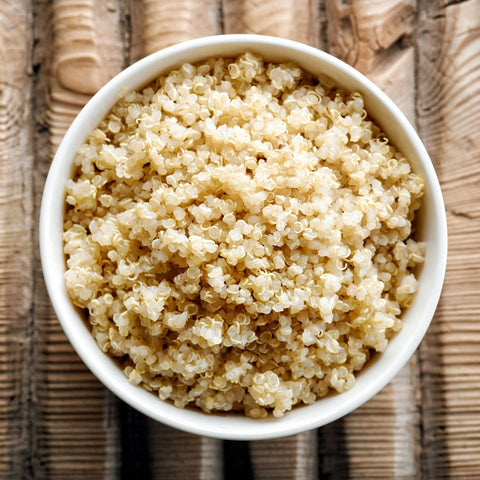
Quinoa
Quinoa is a complete protein that provides you with 8 grams per cup of cooked quinoa. It’s one of the healthiest foods that you can eat, period, and it contains a lot of nutrients aside from protein.
Quinoa provides you with a good source of iron, magnesium, manganese, and fiber, as well as many other trace minerals.
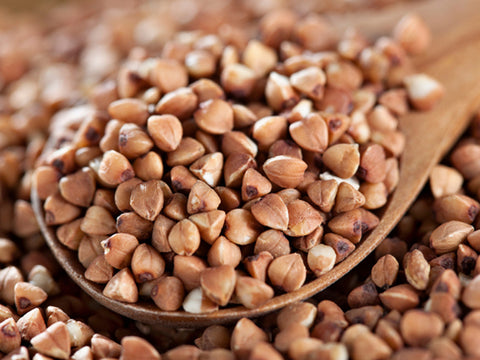
Buckwheat
Buckwheat, which isn’t actually a type of wheat - it’s actually related to rhubarb - is a great source of protein. It’s also been linked to improved cardiovascular health, lower cholesterol levels, and helping to prevent diabetes.
You’ll get 6 grams of protein per cup of cooked buckwheat.
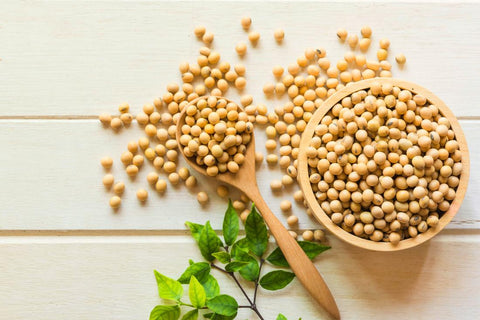
Soy
We have already cautioned you against soy, but using it in moderate amounts is nice. It’s also incredibly dense in protein - just be careful because it’s easy to get carried away eating things like tofu because they pack so much protein in such a small serving.
A half cup of firm tofu will give you 10 grams of protein, and a half cup of tempeh will give you 15 grams of protein. Soybeans are unique because they provide us with a complete protein.
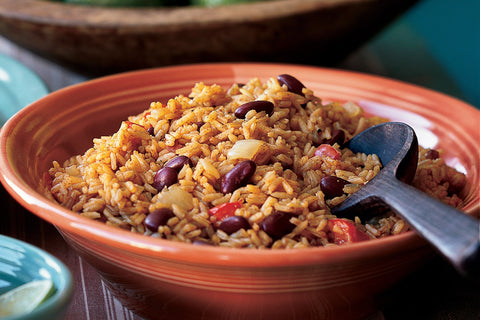
Rice & Beans
Rice and beans should be consumed together to maximize their protein benefits. It’s one of the simplest and most affordable methods for vegans to get enough protein in their diet, and a cup of the two mixed together will provide you with 7 grams of protein. This is comparable to some red meats!
You can also replace the rice with another grain, or replace the beans with lentils or other legumes.
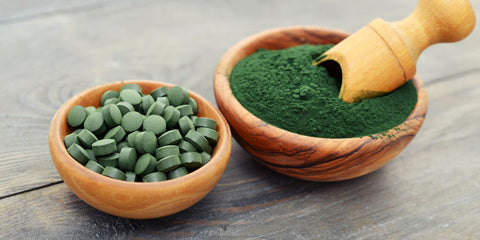
Spirulina
Some people believe spirulina is a complete protein but the truth is that it’s not - it doesn’t have enough methionine and cysteine. The best way to combat this is to include some grains, nuts, or seeds with your spirulina.
Spirulina also provides you with a wild number of health benefits and is considered one of the healthiest supplements you can find.
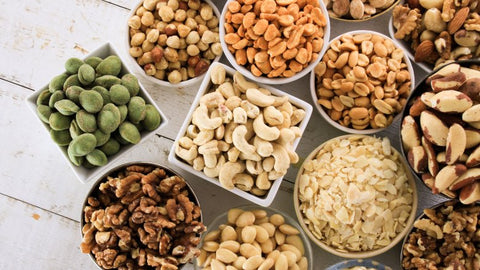
Nuts
You don’t need to eat spirulina with your nuts to get a good source of protein. Nuts are great on their own.
Cashews, walnuts, peanuts, and almonds are great sources of protein that can be snacked on or included in various meals.
Best Vegan Protein Powders
Some people don’t want to deal with all of the intricacies of making complete proteins from vegan food (even though it’s not very difficult). Even those who don’t mind mixing proteins sometimes have difficulty getting the amount of protein that they need in their diet.
For these people, protein powders are one of the best ways to supplement their diet with what they need. This is especially true for bodybuilders - heck, even a lot of non-vegan bodybuilders take protein powders to ensure that they get enough protein.
Some of them are better reviewed than others. There are infinite different brands of vegan protein powder, but one of the main differences comes from the type of protein used in the product.
Here, I’ll just outline the best types of vegan protein powder and leave the brand decision up to you.
Soy Protein Powder
Soy protein powder is made from the soya bean which is known for being the basis of foods like tofu. Soy contains a number of nutrients such as isoflavones and fiber, as well as providing the body with a good source of amino acids for building protein. Furthermore, soy protein is easily digested and can be absorbed well. It’s got a smooth consistency and goes well in a variety of protein drinks. It mixes particularly well with whey protein.
Hemp Protein Powder
Hemp protein powder is, hands down, one of the best kinds of protein powder that you consume whether you’re vegan or not. It provides you with a complete profile of highly digestible amino acids and it works great before your workouts or after them.
There is a lot of fat in hemp protein powder but don’t be wary, because it’s high-quality fat that we need to have a healthy body. That said, if you’re trying to cut down on your weight, hemp protein may not be the best source of protein for you.
Brown Rice Protein Powder
People may associate brown rice more often with carbohydrates than protein, but that said, there is certainly some protein to be found in rice. The less refined it is, the more protein you’ll find.
As we’ve said, rice can’t give you a complete protein on its own. That means you’ll need to take it with something else that will provide you with the missing amino acids. Blending rice protein powder with soy protein powder is a great way to get a complete protein. Other than that, brown rice protein powder is rich in b vitamins and fiber which can go a long way in helping you get strong and healthy.
Pea Protein
Pea protein powder also won’t provide you with all the amino acids you need to build a complete protein, but it’s a great option for those who are allergic to soy and like an affordable form of protein. Pea protein has been shown to help fight off illness. If you consume it during mealtime with a good source of beans or tofu, you’ll have the workings for a complete protein.
Vegan Protein is Easy!
Many people hesitate to try going vegan if they’re an active bodybuilder, but the worries associated with this are generally based on misinformation. Not only is it possible to get a good amount of protein while eating a vegan diet, it’s quite easy.
Generally, eating plant-based protein means that you will also be getting more nutrients than you would from eating meats! This means that not only will you be able to get the protein that you need to grow big and strong but you’ll be able to do it while making sure that you maintain your overall health.
- Get our best nutrition articles, including great vegan recipes by signing up to the Hustler newsletter here.
The truth is that there are so many ways to get enough protein on a plant-based and vegan diet. I hope this vegan protein guide will help you on your plant-based journey; feel free to share with friends who are wondering how to get enough protein on a vegan diet!
